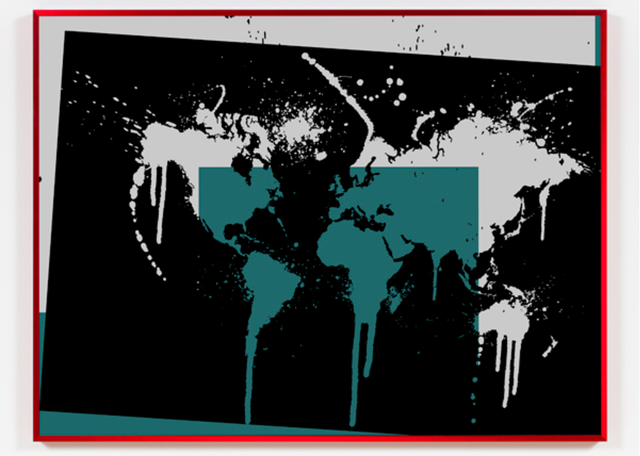But Who is “They”? Roundtable discussion with Manuela Bojadžijev, Nikita Dhawan, and Christoph Menke, moderated by Helmut Draxler on Refugee and Migrant Flows as a Challenge for Political Thought
It has been reported that Angela Merkel found herself, this January, having to explain the Geneva Conventions to Donald Trump over the phone. One might imagine her emphasizing that this promise of the “humane treatment of persons” and “guarantee of basic individual rights” to those affected by war, is a body of explicitly international law – yes, first drafted by European states but by which essentially all legitimate nations now (at least vow to) abide.
But to whom, in practice, do these underlying “European values” apply? In December, art historian Helmut Draxler sat down with philosopher Christoph Menke, political scientist Nikita Dhawan, and migration scholar Manuela Bojadžijev in Berlin to discuss. In the exchange that follows, the movement of people across borders figures as a central concern as the four debate, not least, how the way of distinguishing which “we,” which “them,” is as consequential as the way these categories are then engaged.
Helmut Draxler: We’re here to talk about refugee and migrant flows as a challenge for political thought. These aren’t new issues; we’ve all been concerned with them in one capacity or another for quite some time. Still, the “refugee crisis” and the success of right-wing mobilization efforts have recently lent them an urgency that’s perhaps unprecedented. In your perception, has the situation really changed in some ways over the past year, and does this sudden urgency raise a new question, a challenge for thought, perhaps in the sense of Obama, in his last speech to the UN, cautioning that we now need to defend liberal institutions?
Christoph Menke: It might be that defending liberal institutions, while necessary, isn’t enough. As a formula, it seems to me an insufficient response to today’s problems. It may become a strategic necessity in certain contexts. But as liberal institutions, with their basic principles, appear to be ill-equipped to respond to the challenges that have arisen with the flows of refugees and migrants, defending these structures is not enough. The instruments at their disposal are informed by the idea of human rights, which is, after all, at the core of liberal institutions. Institutions therefore, by default, address the problem in ways that regard the refugees as individuals. As though one could say, yes, there are lots of them, but at the base, we are speaking of many individuals who are coming, each with a defined set of basic needs or basic entitlements that we are then obliged to satisfy or at least take into account. This misrepresentation, however, tends to only reproduce rather than alleviate the problems. The refugees aren’t “individuals.”
We now find ourselves in the unpleasant situation of having to defend the liberal institutions despite our very skeptical view of them – which is to say, even as we realize more and more clearly that they’re structurally incapable of mounting an adequate response to the flows of refugees and migrants. But when we confront right-wing populists, we must nevertheless protect these liberal structures. How do we do that without contradicting ourselves?
Nikita Dhawan: In my view, this perception that we’re currently experiencing something dramatically new is very widespread – but also misleading. When we discuss the role of liberal institutions or basic human rights and feel we’ve entered a phase in which their function and contribution seem newly inadequate or deficient, it’s important to remember that liberal norms were given to us by the Enlightenment and have been flawed since their inception. From Hobbes to Habermas, as you also suggest, we know that these values are inherently Eurocentric and androcentric, marked by – let us continue with the example of human rights – a very normative idea of what “human” is and what “rights” are. From the beginning, their definition has served the interests of a certain privileged class, which enshrined norms with an implicit gender, racial, and sexual bias. And yet despite the postcolonial critique of liberalism, it would seem that, as Gayatri Chakravorty Spivak has argued, “one cannot not want them.” Using the metaphor of a “child of a rape,” Spivak remarks that there’s no way to legitimize the violence that facilitated the emergence of these liberal norms and institutions, and yet the challenge is how to learn to love the child of rape, how to love the legacies of European Enlightenment. How do we instrumentalize these inherited, flawed tools, such as “human rights,” in order to promote and protect vulnerable individuals and groups for whom these tools were not originally intended?
In the context of the refugee crisis, we’re constantly confronted with the question: What can we do for the refugees? And yet, it seems to me, it’s not only the refugees who need help, but also Europeans. Europe (and not for the first time in history) needs guidance to find its humanity. Its self-congratulatory narrative of cosmopolitanism and universal hospitality seems farcical in the face of the history of colonialism. So to turn it around: it’s not the enlightened Europeans, but the migrants and refugees who, the moment they claim their rights from European institutions, states, and civil society actors, become the ethical agents, the agents of decolonizing Europe.
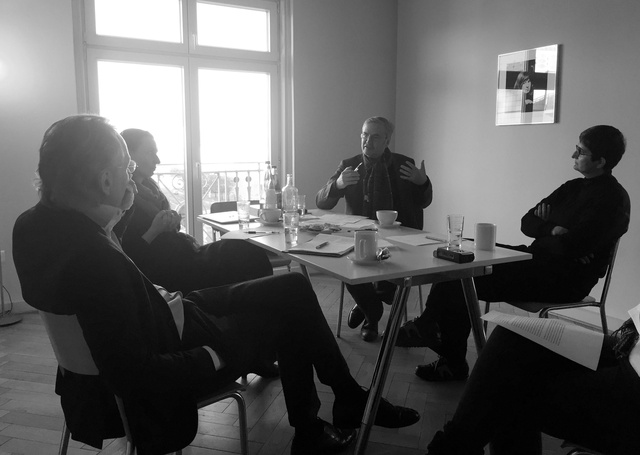 Christoph Menke, Manuela Bojadzijev, Helmut Draxler and Nikita Dhawan, Berlin,
December 2016
Christoph Menke, Manuela Bojadzijev, Helmut Draxler and Nikita Dhawan, Berlin,
December 2016
Manuela Bojadžijev: First I’d like to say that we should speak not of a refugee crisis but of a crisis of migration policy, and a crisis of the European Union as well – we should avoid drawing a discursive or causal connection between the crises we’re experiencing and the refugees.
Now, the decolonization of Europe that Nikita speaks about is a trope of critical theory that’s always relevant: you have, on the one side, the notion of that which comes from the outside; and then critique, which is seen as coming from the inside. As such, those who are coming from outside to the inside are the border-crossers of these critical figures. Thinking of those who are escaping to Europe as laying the foundation for a renewal of critical theory strikes me as an interesting idea. Because migration then comes into view as a critique of liberal institutions that puts the latter to the test. It helps us analyze the contradictions of liberalism that are thrown into sharp relief, for example, by the way in which liberal institutions deal with refugee and migrant flows and these border crossers.
This critique also has implications for the relation between thinking and praxis. It faces the challenge of an authoritarian populism that openly questions the relevance of reality. Everybody talks about “post-truth” today: that’s not a new technique, it’s been an element in right-wing discourses for a long time (Holocaust denial being one well-known example). But we also know it from political communication, where it’s known as the “staging of reality.” In the United States, in Turkey, in India, Russia, Poland, Hungary, etc., we now observe the pattern of an authoritarian populism, represented elsewhere by parties such as UKIP, Front National, FPÖ, and AfD. If we look at Turkey, where, in a cultural transformation pushed by the AKP, Erdogan’s right-wing thinking has filtered deep into everyday life, there’s another characteristic feature that’s relevant to the question of liberal institutions. Because for years, the AKP’s politics were also geared toward the everyday lives of the Turkish community in Germany and helped to mobilize its voters here. I mention this because such mobilization of a “long-distance electorate” has consequences for “liberal institutions” as well. How do we envision sovereignty under these new conditions when the liberal institutions were hitherto conceived as national institutions of a community defined in national terms?
This is where I believe that thinking through migration is helpful. Hannah Arendt and, following her, Étienne Balibar and many others, have addressed this question of the self-transcendence of the political community, which, again, has implications both within the community and for its relations to the outside world, raising the question of the democratization of borders.
Dhawan: I think what we urgently need to undertake is a Foucauldian “history of the present,” namely, to analyze how we got to this point where Europeans once again are staging themselves as the ones whose manifest destiny it is to carry the “white man’s burden” and save the world. And this is only possible through a convenient historical amnesia about colonialism. To follow up on the idea of post-truth: I just reviewed a book, “Kant and Colonialism,” in which, although the contributors admit to Kant’s racism, he’s still presented as an anti-colonial thinker, the narrative being that he had a change of heart later in life and gave up his earlier theory of a hierarchy of races. Despite decades of “fact-checking” by postcolonial feminists, we’re encountering a revisionist reading of the European Enlightenment in which writings of scholars like Kant are “whitewashed” and presented as anti-colonial. Along similar lines, feminists, for decades, have been compiling data and statistics showing the gender pay gap and the persistence of discrimination in the labor market. And yet the problem of gender inequality is either ignored or culturalized and orientalized and projected onto minority communities and the global South. It’s interesting for someone like me, who has to constantly defend the relevance of postcolonial critique for Germany, to witness this sudden talk of “post-truth” [and now the Trump administration’s embrace of “alternative facts”].
But to come back to the point regarding the continuities between colonialism and current migration regimes: as we know from the experiences of slavery and indentured labor, there’s a prehistory to the racialized economic exploitation of migrants by Europeans. Let us jump a few hundred years forward to post-National-Socialist Germany and the guest worker system (Gastarbeiter), which reinforced colonial patterns of ethnicized labor. Such policies are making a comeback in a certain way in the name of integrating current refugees into the European labor market and how for example, given the demographic crisis, there’s talk of the ways in which the German economy could benefit from the new migrants.
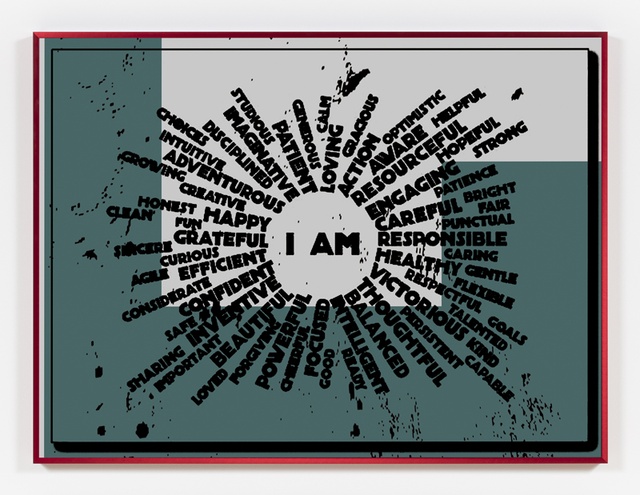 Georgie Nettell, „Being Different“, 2016
Georgie Nettell, „Being Different“, 2016
Helmut Draxler: The question, of course, is what relative significance these different kinds of history that you’ve mentioned – the history of colonialism, of fascism, and of labor migration – have for the current debate. I brought up Obama in my opening question as something of a provocation: How to live up to that era’s ambition of political thinking, how to transcend today’s decision-making processes and urgencies to formulate ideas that are irreducible to the pragmatics of day-to-day politics? We would first need a form of thinking that takes the historical frame of reference into account yet does not become absorbed in it. Such a thinking would have to concern itself, from the start, with the social categories that undergird the basic description we can give of refugees as this directly impacts the relation between different forms of “we” and “you”: we who are considering these issues, we who have passports, who participate in various social or cultural contexts. There appear to be no unified lines of conflict in this field. Why does it seem so difficult right now – roughly since the New Year’s Eve incidents in Cologne – to think in intersectional terms? As leftists, “we” are feminists, anti-racists, anti-capitalists, but in reality the common ground shared by these categories again and again turns out to be a problem. An insurmountable conflict suddenly seems to separate feminist from anti-racist politics, or the questions of identity politics as a whole from the economic questions of class that Badiou, Žižek, and others have forcefully argued are the truly primary concerns. Aren’t these old conflicts that have nonetheless taken on a novel and specific urgency?
Bojadžijev: In the wake of the 2015 summer of migration, there was a shift in the way the movement of refugees is talked about in Germany: the question of humanitarianism now takes a back seat to issues of security and economic potential. By giving refugees access to the labor market, the government met longstanding demands to end their exclusion. And yet this liberalization was reinterpreted within a paradigm of utility. The new measures designed to promote integration into the labor market were drawn up by the Office of the Federal Chancellor and the Federal Office for Migration and Refugees (BAMF) in cooperation with a business consultancy, resulting in a (flexible) system of categories to which refugees are assigned; their prospects of being granted the right to stay are assessed based on their country of origin. But this logic of making the country of origin determinative has racist dimensions and is at odds with the economic utility of refugees, which depends on individual factors.
That brings me to a second contradiction: Trying to achieve security through control over people’s mobility, the authorities, on the one hand, seek to monitor and control the individual (by taking and registering fingerprints and other personal data collected at the borders and possibly by establishing Europe-wide access to this via data centers); on the other hand, they define groups based on people’s origin. These two different logics for making distinctions clash.
Menke: I think I also want to object to the argument that there’s nothing new about the current situation, the ongoing crisis. The universalist Western-democratic self-conception that has taken hold in Germany since the 1970s and that people now talk about in perhaps self-congratulatory fashion has never been put under stress. What’s happening is actually a new experience for Germany, and unfortunately, looking to countries and contexts that went through this experience in the past, like France and England, is of no avail. There’s really no good example or model that would help us resolve this situation and its urgency.
If, on the one hand, you have a humanitarian discourse that’s largely invested in individuals and, on the other hand, an administrative and economic discourse that clusters these individuals in certain ways, then the kind of collectivity that we would call political is sidelined. There’s no room for it, neither in the ethical-humanitarian discourse, which knows only individuals, nor in the institutional discourse, which operates with clusters defined by functional aspects. Neither discourse can describe how collectives form in migrant movements and whether those collectives might not possess a genuinely political dimension. Should we not describe this migration – say, from Syria – in very different terms? Of course it’s “individuals” who arrive, but do they actually arrive as individuals who are then assigned to economic and administrative clusters? In migrating – meaning, here, both what motivates their coming to Europe, but also the organization of their migration – don’t they in fact constitute peculiar kinds of collectives that evince a political aspect as well? Aren’t these political actors who perhaps have no intention of arriving in society here but actually hope to found a New Syria in Kreuzberg or in rural Bavaria or maybe to just set up a temporary Syria wherever abroad? Political actors are always collective actors, never individuals. We would have to start bringing very different paradigms into play to make sense of this migration; the exodus of the Israelites from Egypt was also an act of emigration. If someone had helped them in the desert by furnishing every individual one of them with the means to satisfy their “basic needs,” that wouldn’t have been conducive to their political self-constitution as a people without geographically defined national borders.
To gain a perspective on the phenomenon beyond the alternative of humanitarian individualization and economic clustering, a genuinely political perspective, we would need to look at these collectives (or processes of collectivization) that emerge in migration. Then we would see very different types of actors and need very different terms to describe them adequately.
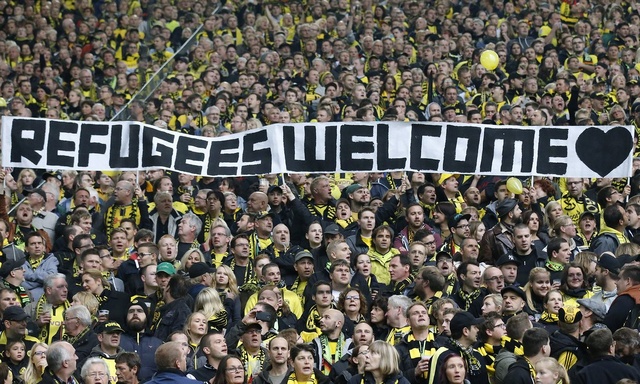 Soccer fans in Dortmund, September 2015
Soccer fans in Dortmund, September 2015
 Georgie Nettell, „No Future”, 2016
Georgie Nettell, „No Future”, 2016
Draxler: But I would disagree with Derrida here. In his concept of hospitality, there would be no distinction anymore between the host and the guest.
Dhawan: That’s the brilliant part. Derrida’s notion of “unconditional hospitality” implies that the host gives up mastery of his house and becomes the hostage of the guest.
Draxler: Right. So what would that mean in political terms? Doesn’t the whole problem of asylum disappear in such an argument? Can specific conflict situations such as the scene at Cologne Central Station even be addressed in such a perspective? When we’re always ready with the same answer that’s the lesson of history, aren’t we at some point going to come up against a problem where we’re no longer capable of thinking the contradictions between sexism and racism, between those who seek protection and those who offer it?
Dhawan: As I mentioned earlier, it’s important to focus on how, in Europe, the stereotype of the “misogynist refugee” is being mobilized to abdicate responsibility and deny refugees their human rights. For decades now, despite vocal feminist protests, projects that work on issues of gender violence, for example women’s shelters, anti-discrimination reform laws, rape laws, etc. – all of these have been systematically defunded and dismantled and neither state actors nor civil society actors have reacted to these regressive measures. Interestingly, the moment a group of male refugees attacks German women, even the most conservative German politicians and civil society actors (I’m not just talking about Bild, but also about so-called intellectuals who never cared about gender politics) suddenly become feminists adamant about protecting and promoting gender equality. So here I would ask with Foucault: At what point does something become a problem? And what kind of tactics and strategies are mobilized to rationalize solutions for the perceived problem? As I’ve already shown, there’s an abiding pattern of instrumentalizing gender equality as a justification narrative to uphold the superiority of European values, and in turn stigmatize non-Europeans in an orientalist manner.
Menke: As I read Derrida, he doesn’t believe that unconditional hospitality exists as a practice. We also mustn’t forget that the examples of hospitality outweighing all other obligations with which his short book concludes are all examples of violence; as when the host’s wife is surrendered to the mob that will rape her to protect the guest. What Derrida is trying to say in these passages is exactly the opposite: there are always only practices of conditional hospitality. But it makes an enormous difference whether we think of that conditionality as absolute, as resting on itself, or as hypothetical, experimental, as necessarily subject to ongoing reexamination in light of unconditional demands. Derrida thinks that there can be no resolution to the dialectic of conditional and unconditional nor to that of boundless and limited hospitality. It’s inevitable for Derrida that there will be limitations. The question is always how, not whether, boundaries are drawn.
Dhawan: According to my reading of Derrida, he claims that we don’t really know what hospitality is and links this to the issue of transnational ethics, wherein ethics is the experience of the impossible. So yes, unconditional hospitality in the Derridean sense isn’t possible. Furthermore, Derrida, focusing on Kant’s discussion of Wirtbarkeit (hospitality), outlines the economic aspects of the universal principle of hospitality (the root “Wirt” is of course linked to Wirtschaft, economy), and inquires into who has the power to define the conditions of hospitality in the household and beyond. In the German context, we should consider the self-congratulatory manner in which the German press and international media have portrayed German Willkommenskultur. However, even as hospitality is being extended to the refugees, the costs and benefits that they bring to the German economy, as Manuela noted, are being calculated. It’s imperative not to lose sight of this inextricable link as well as the conflict between ethics, economy, and politics.
Bojadžijev: To come back to the question of intersectionality: fortunately, after the events in Cologne, there were strong public feminist voices that condemned both sexism and the instrumentalization of feminism to racist ends, speaking out against the bigotry of right-wing agitators usurping feminist arguments.
And yet those who played one off the other were nevertheless successful in stoking affects that allowed right-wing positions to challenge the so-called Willkommenskultur. This shift, I believe, was bound up with a receding concern with solidarities, receding also on the theoretical level. Our critical thinking is heavily warped by the reproduction of an almost technical notion of social groups and their mutual relationships, a vision in which the effort to transcend identitarian positions has ceased to play a meaningful role.
Meanwhile, we’re observing a right-wing mobilization of identity politics. Positions that have been familiar to feminists since the debates of the 1980s, that used to enable us to draw distinctions between sexist attacks and racist arguments, are fading from view. Right now, the question of crisis is played off against the migrants in two ways. They’re portrayed both as the ones who cause the crisis and as the ones who don’t suffer its repercussions. The discourse about those who are supposedly victims of the economic crisis, who deserve understanding and whose difficult situation fuels their rejection of migration, makes a sweeping assertion that those at the bottom end of the economic scale are Germans. But poverty in Germany affects migrants first and foremost. Yet the right succeeds in turning the issue into an identity politics for Germans, a politics openly advocated, for example, by the identitarian movement with their motto “0% racist, 100% identitarian.” The argument has proven shockingly popular, and identity politics is mistaken for social analysis and critique.

Draxler: We would probably do well, in this discussion, to avoid the concept of identity politics altogether as, rather than emphasizing the crucial aspect of social difference, that discourse takes difference as a springboard to move on to assertions of essentialist or identitarian positions. The fundamental question, in the end, is how to think difference as the foundation of community – the questions of welcoming of hospitality, of solidarity, as raised by Arendt – and these are all questions that concern the inside-outside relation of socially organized entities. How inclusive, how exclusive do they need to be? Are we dealing with a social or a political formation? What part do economic and cultural factors and borders as such play? What’s vital, I believe, is to think community without the particularist blinders of the nation state. And that seems to be difficult, as numerous examples illustrate, from the art historian T. J. Clark, who is pro-Brexit, and Žižek, who supported Trump, to Sahra Wagenknecht, who believes that we can practice communism in small national units. So it’s not like certain forms of leftist critique aren’t actually quite comfortable within tightly drawn borders.
Christoph Menke: We can’t raise the political question, the question of community formation, communities, collectivities, without also asking how to think borders in different terms. To envision an alternative to the identitarian form of community (for example, in the nation state), we must think new forms of boundary, ones that can actually be justified, that are substantiated by contexts of praxis or institutions, which are always sustained by specific people together with other specific people and take place in specific circumstances and have boundary regimes that can be of various kinds. We might say that the drawing of borders is conceivably sensible and perhaps also imperative in ways that make sense only when we’re dealing with social contexts that evince the structure of practices, as a form of cooperative work on something that’s established as the shared goal. But our social contexts don’t evince this structure. Only after fundamentally changing the structure of the social contexts might we raise the question of borders. That, I think, would be a leftist answer to the question of borders: given how the economy functions today, or, say, the university functions today, there’s nothing to justify borders because these social contexts don’t in any way constitute practical contexts of cooperation.
The identitarian usurpation of the concept and sentiment of solidarity by the right (as described, for example, by Didier Eribon) responds to the experience of an absurd cooperation: between liberal universalism on the one hand and imperatives of economic utilization on the other that destroy the social contexts of praxis or cooperation. With the right’s theatrical rhetoric and its building on this experience, it can then argue that it’s the liberals – and not the economy – who destroy forms of solidarity. So we must not accept the conventional description of the current situation. By that description, one can only be either an abstract universalist or an aggressive identitarian particularist, and that’s the wrong alternative.
Bojadžijev: Yes, because when community is understood as having a substantial foundation, one loses site of how community is constituted and reproduced.
But who is actually extending solidarity right now? A fairly large number of the volunteers who care for refugees today are women and people from so-called migrant backgrounds. Research on their work shows that their involvement increasingly brings them into conflict with the authorities, which is to say, with the very so-called liberal institutions we were talking about. They realize more and more clearly that they experience the support they offer – for example, by accompanying people to the foreigners’ registration office, etc. – as a source of frustration. They share an experience that’s otherwise exclusive to those whose legal status is precarious. I believe that that’s an interesting contradiction that can be harnessed politically. When we raise the question of what solidarity and hospitality mean in concrete terms, this, I think, would be a starting point for a political debate.
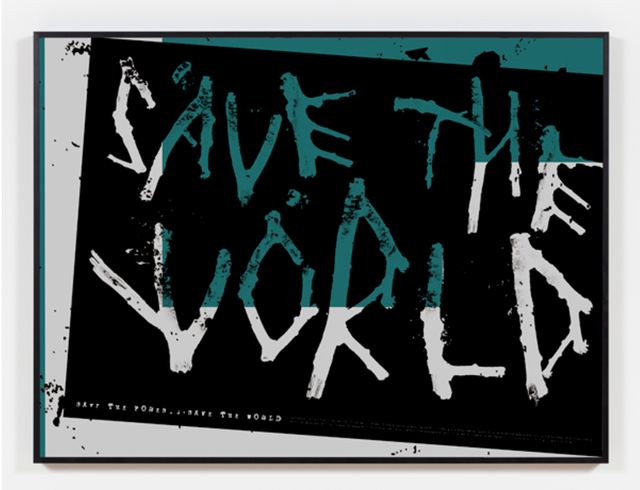 Georgie Nettell, „Stay Vegan”, 2016
Georgie Nettell, „Stay Vegan”, 2016
Dhawan: All these examples once again confirm my claim regarding the urgency of decolonizing Germany. In my view, in the context of the current refugee crisis, Germany will only be capable of addressing the question of solidarity if it is willing to acknowledge and learn from its past crimes, mistakes, and failures. The French economist Thomas Piketty gave an interesting interview in Die Zeit about the Greek debt crisis, wherein he comments on Germany as a country that has throughout its history never repaid its debts, even as it demands that other countries pay theirs. Piketty’s comments resonate with the Nietzschean idea of Schuld as both guilt and debt. By staging itself as more charitable and hospitable than other EU countries, especially East European countries like Hungary, Germany styles itself as more ethical and humanitarian and cements its geopolitical power without acknowledging its historical debt and guilt.
Bojadžijev: But if that’s so, we need to make the contradictory situation you describe the point of departure. If such a thing as a community extending a Willkommenskultur exists, then we have to contribute to charting its course and giving it a future and making it practicable.
Dhawan: Personally, I refuse to congratulate the Germans for their attempts at being ethical.
Bojadžijev: But that’s not what I said.
Nikita Dhawan: Okay, then I misunderstood you. Because I think they should be doing what they’re doing and they should be doing more than what they’re doing and not …
Bojadžijev: But who is they?
Dhawan: Whoever is on the privileged side of transnationality.
Bojadžijev: We all are; we all live here.
Dhawan: Yes … and there are limits to what each of us can do. For instance, I’m not a German citizen and so I can’t vote for certain parties to come into power and hold them accountable. I am, in a certain way, also a guest, although a very privileged one.
Bojadžijev: All of us who live here are – in very different ways – but that doesn’t relieve us of the obligation to take a stance.
Draxler: I want to come back to the question of what we are to make of borders: To what extent do they always already determine us and “productively” inform our identities? Are there ways to bring this productive aspect to bear in politics? And how should we deal with the resulting exclusions – or would the ideal be a borderless state of affairs (“no borders,” as a rallying cry of the 1990s had it)? Wouldn’t such a credo ultimately amount to an abstract universalism and cosmopolitanism that, as Chantal Mouffe has objected, precludes any political dimension?
Menke: The problem is that a meaningful engagement with the problem of the border would require conditions that aren’t present right now. We can’t justify drawing definite borders because their justification always already presupposes something – the existence of social practices and contexts of cooperation – that doesn’t actually exist. What exist are contexts of economic utilization or educational contexts designed with a view to functional purposes for which the question of borders is of a different nature. it’s an economic or functional – not a political – question.
So we’re in a paradoxical situation. We really would need to revise the social contexts and institutions that exist today, to try and reinvent them, in such a way that they come closer to realizing the idea of social cooperation. What, for example, would universities look like if they were contexts of cooperation (rather than designed with a view to the logic of economic utility)? And above all, how would such a university (which doesn’t exist) engage with the question of borders? If we could answer these questions, we would be able to adequately address the questions of immigration into the institution and justifiable and unjustifiable exclusions. We would have to work on a radical redescription of our institutions before we could even meaningfully respond to the question of borders. But since such a redescription is always merely our invention and reality doesn’t conform to it, it doesn’t yield readily actionable proposals or practicable strategies.
Draxler: These prerequisites are a crucial point. We can’t conceive of the border other than in a sort of dialectical relation to something that’s indeed unbounded, that precedes the drawing of the border. That’s a neat intellectual model, but it’s difficult to articulate as a practicable politics, also with a view to the promises that a leftist politics can make. The central promise of a leftist politics – and that right there is its problem in the concrete battle against the right – is one of guilt, of sacrifice and penance. How do you make that the basis for a mobilization toward a shared praxis when there’s nothing to be gained? The fact that there’s no phantasmatic jouissance, as Žižek calls it – and not just for white heterosexual middle-class men – points to the problems that beset the attempt to translate these ideal models into a concrete politics. That’s also why a lot of people seemed to vote for Trump, knowing full well that he won’t serve their real interests at all – he invites an imaginary identification with his promise of success.
Dhawan: I’m reminded of Hannah Arendt who remarked: “The problem was not what our enemies did, but what our friends did.” I’m of course worried about what the right-wing populists are doing in Europe, but I’m equally concerned about what the left-liberal groups are doing in the name of solidarity. If we’re talking about borders, there are physical borders that we of course need to take seriously, but I’m also interested in the metaphorical border between those who are dispensing solidarity (thereby monopolizing agency through these actions) and those who are receiving aid and help. Are the rights and interests of the latter group truly being granted and met? How are we going to develop a politics of friendship and an ethics of listening that undoes this discontinuity between the givers and receivers?
Bojadžijev: We’re currently witnessing a revival of old taxonomies, of techniques of categorization that are meant to constrain us while asserting that “We’re the cosmopolitans; it’s the others who are sexist, undemocratic, homophobic.” That’s the constellation in which the positions are being renegotiated.
And that’s actually happening, as in the mobilizations of women around the world against Trump after his inauguration, against the right-wing government’s abortion laws in Poland, against laws that would make rape legal if the perpetrator subsequently marries the victim in Turkey, and in a large rally decrying violence against women in Italy. A global day of women’s solidarity is scheduled for March 8.
Dhawan: These are political moments where categories of identity are mobilized to enact progressive politics.
Bojadžijev: There’s no undoing the ambivalence. But the history of such engagements shows that only solidarity through tenacious coalition-building brings success. This means that everyone must step away from their respective identity positions and take a political stance. When racism or sexism or homophobia are conceived of exclusively as oppression of those they objectify as women, etc., then we fail to recognize the social relations that these forms of oppression reproduce and inflict on all of us.
Draxler: Is this ambivalence between essentialist categories and their tactical deployment something we just have to come to terms with, or might it be operationalized as a deliberate cultural strategy of systematic obscuration and confusion? Would the goal ultimately be to reach the zone of indistinguishability between friend and enemy, politics and police?
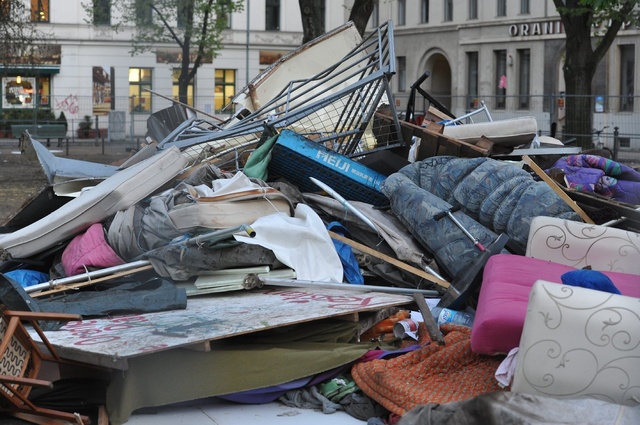 Dismantled refugee protest camp, Oranienplatz, Berlin, 2014
Dismantled refugee protest camp, Oranienplatz, Berlin, 2014
Bojadžijev: The distinction between an essentialist category and its tactical deployment has never really made sense to me. For several reasons: One, it requires a tactical, which is to say, conscious and deliberate deployment, as though the distinction between submission and tactics were entirely up to us. When the deployment becomes a tactic, we’ve always already walked into the trap. By contrast, when we set our sights on a liberation from categories that subject people, then at least we’ve tried. For the same reason, I believe that the questions of collectivity and solidarity are much more consequential for political action than that of consciousness. And two, a tactical deployment of categories, whatever that means exactly, always also effectively reproduces them and does far too little to displace, obscure, and confound them, which would imply a refusal to recognize the gesture of subjection. We might also speak of de-subjection and de-identification, to throw a couple of old concepts into the discussion. There are infinitely many historic examples of how this can be a successful strategy. And three, I’ve always been persuaded by the insight that, say, sexism is a gender relation that will change only if we modify not only the relation, but also the conditions that underlie it. Which brings us back to the figure of critique, from the outside, from the inside, and transversal.
Dhawan: I would propose a double strategy: One the one hand, the lines of discontinuity between hosts and guests, givers and receivers, West and the rest must be blurred toward a post-identity politics. On other hand, as argued by Gayatri Spivak, strategic essentialism functions as a useful tool for processes of decolonization, wherein differences within a collectivity like “women,” “queers,” or “migrants” are temporarily suspended and a unity is tactically assumed for the sake of achieving political goals. So my last words on the issue of solidarity in light of the present refugee crisis are the memorable lines “for the white person who wants to know how to be my friend” by the African-American lesbian feminist poet Pat Parker: “The first thing you do is to forget that I’m black. Second, you must never forget that I’m black.”
Menke: I believe that essentialism, strategic or otherwise, is always wrong. Because what essentialism means is that some characteristic of subjects is taken to determine their essence. But subjects don’t have a (determinate) essence; that’s what defines them as subjects. So it’s either essentialism, the determination of essences, or subjectivity: you can’t have both. But of course the fact that subjects, including political subjects, don’t have determinate essences by no means implies that they have no determinations – goals, desires, experiences, histories, etc. – that matter a great deal to them, sometimes so much so that without them they wouldn’t know how to go on living. So I think Helmut Draxler has it exactly right: the abstract antithesis between determinacy and indeterminacy (with everything that’s tied up with it, especially the antithesis between police and politics) is impractical in this context. People always fight for something specific, something that’s so important to them that they refuse to surrender it. And that’s not a privilege of the marginalized; it’s true of all political subjects.
Translation: Gerrit Jackson
This conversation took place in German and English.
Notes
| [1] | Georgie Nettell, „Civilisation“, 2016 |

